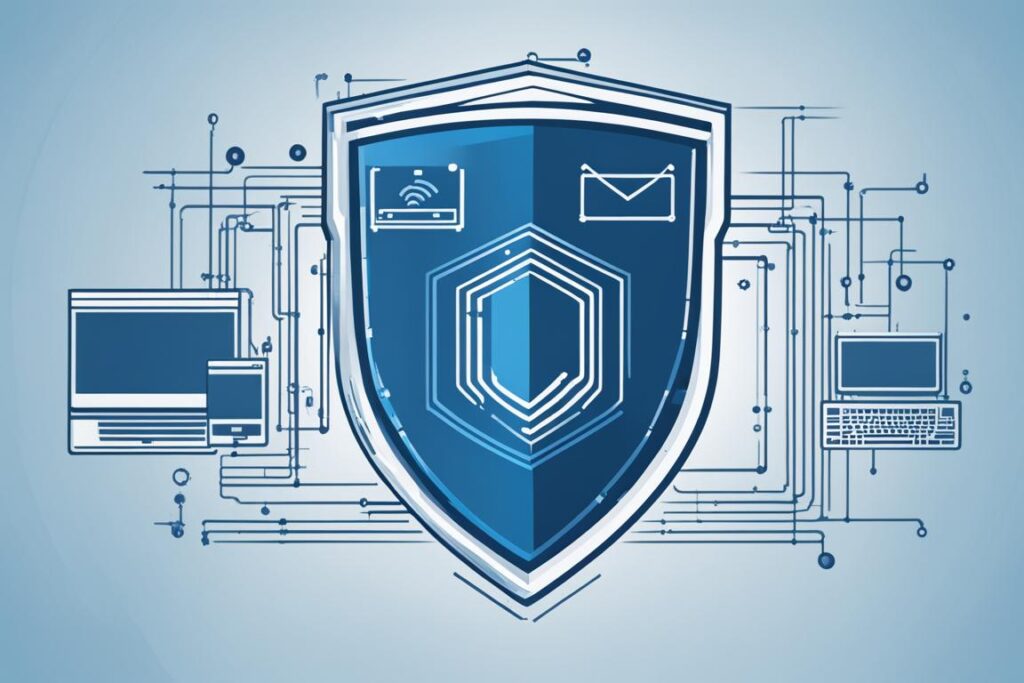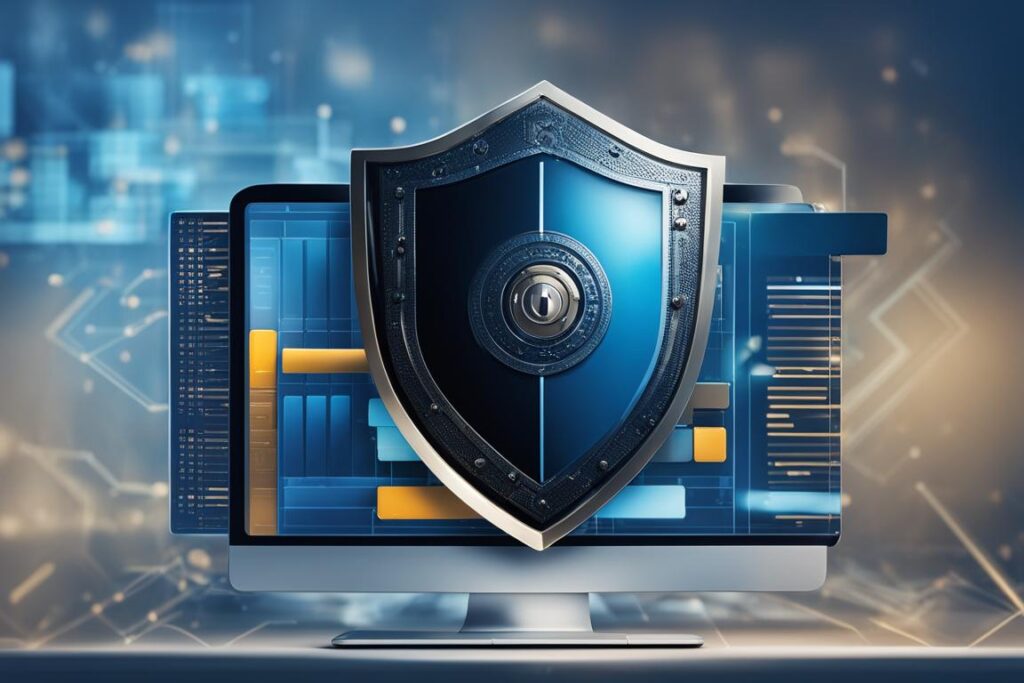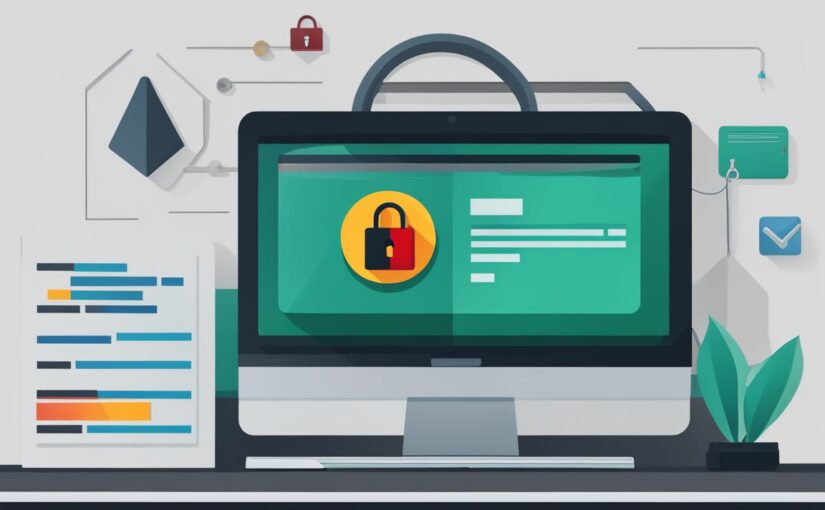With the increasing reliance on online services and transactions, cybersecurity has become a critical issue. Cybercrime prevention is essential for protecting personal and financial information from cyber threats, such as hacking, phishing, and identity theft. It is crucial to implement effective cybersecurity measures and practice online safety guidelines to ensure internet safety and data protection.
Key Takeaways:
- Implement strong and unique passwords to safeguard personal information.
- Use encryption and secure browsing habits to protect against cyber threats.
- Protect financial data by using secure payment methods and being cautious of phishing attempts.
- Keep devices and networks secure by updating operating systems and software and using firewalls.
- Regularly monitor bank and credit card statements and report suspicious activity.
Understanding Cybercrime
Before diving into cybercrime prevention measures, it’s important to have a clear understanding of what cybercrime is and the types of cyber threats that individuals and businesses face.
Cybercrime refers to any illegal activity that is carried out through the internet or other digital means. Cyber threats can take many forms, including malware, phishing, hacking, and ransomware attacks.
One of the most significant challenges of cybercrime is the constantly evolving nature of cyber threats. As individuals and businesses implement new cybersecurity measures, cybercriminals find new ways to exploit vulnerabilities and gain unauthorized access to personal and financial data.
Therefore, it is critical to stay up to date on the latest cybercrime prevention techniques and implement robust cybersecurity measures to safeguard against cyber threats.
Importance of Cybersecurity Measures
With the rise of cybercrime, implementing cybersecurity measures has become crucial for protecting sensitive data and digital privacy. Here are some online security tips for individuals and businesses:
- Use strong and unique passwords, and enable two-factor authentication.
- Regularly update software and operating systems to patch security vulnerabilities.
- Install anti-malware software and keep it up to date.
- Use firewalls, VPNs, and encryption to secure networks and data transmission.
- Be mindful of suspicious emails and avoid clicking on links or downloading attachments from unknown sources.

By following these cybersecurity best practices, you can minimize the risk of cyber threats and protect your personal and business information.
Safeguarding Personal Information
In today’s digital age, personal information is a valuable commodity that must be protected at all times. The following data protection strategies and digital privacy solutions can help keep your personal information safe online:
- Use strong and unique passwords: A strong password includes a mix of upper and lowercase letters, numbers, and symbols. Do not reuse passwords across different accounts.
- Encryption: Use encryption to secure sensitive information such as financial data. Look for websites with “https” in the URL, as it indicates a secure connection.
- Secure browsing habits: Avoid clicking on suspicious links or downloading files from unknown sources. Use a trustworthy antivirus program to protect against malware and spyware.
“Safeguarding your personal information is crucial to protect yourself against identity theft and fraud. Always be cautious when sharing your personal information online.”
By implementing these strategies, you can better protect your personal information and maintain your digital privacy.
Protecting Financial Data
Protecting your financial data is essential to safeguarding your identity and preventing fraudulent activity. Here are some data protection strategies and online fraud prevention tips you can use:
- Use secure payment methods when shopping online to prevent unauthorized access to your financial information.
- Regularly monitor your bank accounts and credit card statements to ensure no unusual activity has taken place.
- Be cautious of phishing attempts, which can trick you into giving out sensitive information or downloading malware. Always double-check email addresses and links before interacting with them.

Remember, prevention is key in protecting your financial data from cyber threats. By being proactive and implementing these strategies, you can stay one step ahead of potential online fraudsters.
Securing Devices and Networks
Securing your devices and networks is crucial for protecting your sensitive and personal data from cybercriminals. To protect against cyber threats, it is essential to keep your operating systems and software up to date. This ensures that any security vulnerabilities or weaknesses are patched and locked down, preventing hackers from exploiting them.
Another effective way to secure your devices and networks is to use firewalls to monitor and control incoming and outgoing network traffic. Implementing strong network security protocols, such as WPA2 encryption and two-factor authentication, also provides an additional layer of security.
Remember to regularly back up your important files to an external hard drive or cloud-based storage system. In case of a security breach or hacking attempt, you can easily restore your files and data without any loss.
Educating Yourself and Others
One of the most important aspects of cybercrime prevention is staying informed about online safety guidelines. Educating yourself and others about the risks associated with cybercrime and best practices for online safety is key to staying protected against cyber threats.
Identifying and Avoiding Suspicious Emails and Websites
One of the most common methods by which cybercriminals attempt to gain access to personal and financial information is through phishing. Phishing scams typically involve the use of fake emails or websites designed to look like legitimate companies or organizations. To avoid falling victim to phishing scams, it is important to know how to identify suspicious emails and websites. Always check the sender’s email address and be wary of any requests for personal or financial information. Similarly, be cautious of any website that asks for sensitive information or seems designed to mimic a legitimate site.
TIP: Watch out for emails or websites that contain urgent messages or threats. Cybercriminals often create a sense of urgency or fear to pressure users into making hasty decisions.
Teaching Others
It is not enough to simply educate yourself about cybercrime prevention and online safety. It is also important to share this knowledge with others, particularly children and vulnerable populations who may be less aware of the risks associated with online activity. Some important tips to share with others include the importance of creating strong and unique passwords, using anti-virus and anti-malware software, and being cautious when downloading or sharing files or links online.
By working together to promote online safety and cybersecurity, we can help prevent cybercrime and protect our personal and financial data.
Maintaining Privacy on Social Media
Social media platforms have become an integral part of our daily lives, allowing us to stay connected with friends and family. However, it’s essential to maintain your privacy while using social media to avoid any potential data breaches or identity theft.
Adjust Your Privacy Settings
Most social media platforms offer customizable privacy settings that allow you to control who can see your posts, comments, and profile information. It’s crucial to adjust these settings according to your preference and comfort level.
You can choose to hide specific posts from certain users or restrict who can view your profile information. Remember to review and update your privacy settings regularly to ensure they align with your current privacy needs.
Be Mindful of Information Shared Publicly
Posting personal information such as your home address, phone number, and email address on social media platforms can leave you vulnerable to cyberattacks and identity theft. Hackers can use this information to create fake accounts or steal your identity.
Therefore, only share personal information with trusted individuals and avoid publishing it publicly. Also, be cautious of clicking on suspicious links from unknown sources or revealing any sensitive information online.
“Protecting your privacy on social media platforms requires a proactive approach and a thorough understanding of the available privacy settings and potential vulnerabilities.”
By following these data protection strategies and digital privacy solutions for social media platforms, you can maintain your privacy and protect your personal information online. Remember to stay vigilant and practice safe internet habits to keep your data secure.
Securing Home Wi-Fi Networks
Ensuring the security of your home Wi-Fi network is crucial to protect against cyber threats. Here are some best practices to follow:
Change Default Passwords
One of the most fundamental steps you can take to secure your home Wi-Fi network is to change the default password for your router. Choose a strong and unique password, and avoid using common phrases and personal information that could be easily guessed.
Enable Encryption
Encryption is a vital cybersecurity measure that encodes data transmitted over the network, preventing it from being intercepted by hackers. It’s recommended to enable WPA2 or WPA3 encryption, as these are the most secure encryption protocols available.
Restrict Access to Unauthorized Devices
Limiting access to your Wi-Fi network can also help prevent unauthorized access and potential cyber threats. Use a strong and unique network name (SSID) and password, and consider enabling MAC address filtering to ensure that only approved devices can connect to your network.

By following these cybersecurity measures and internet safety practices, you can help safeguard your home Wi-Fi network and protect against cybercrime.
Proactive Monitoring and Response
To protect against cybercrime, it is crucial to implement cybersecurity measures that extend beyond prevention. Proactive monitoring and response are essential components of an effective cybersecurity strategy, helping to detect and address potential threats before they cause irreparable damage.
Regularly reviewing bank and credit card statements is an important aspect of proactive monitoring, allowing individuals to quickly identify any unusual activity or fraudulent charges. By using identity theft protection services, individuals can receive alerts when their personal data is compromised, enabling them to take prompt action to prevent further damage.
Reporting suspicious activity to the appropriate authorities is another critical step in proactive monitoring and response. Cybercrime prevention is a team effort, and by working together to identify and address potential threats, we can effectively safeguard our data and protect against online fraud and hacking.
By putting these measures in place, we can significantly reduce our risk of falling victim to cybercrime. Remember, prevention is only the first step in the fight against online threats. To truly protect ourselves, we must remain vigilant and stay informed about the latest cybersecurity trends and best practices.






